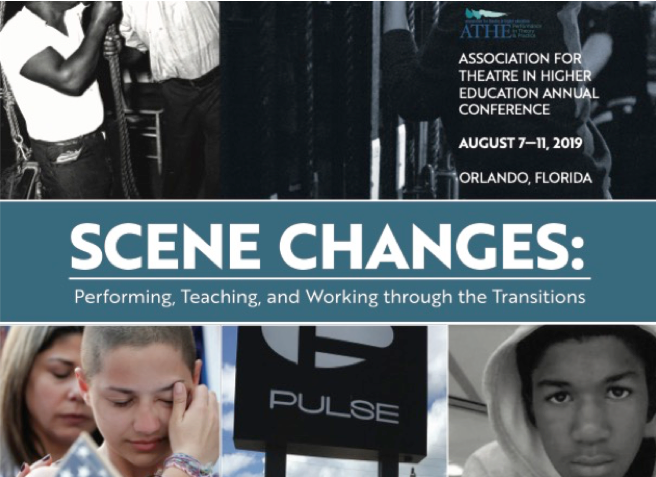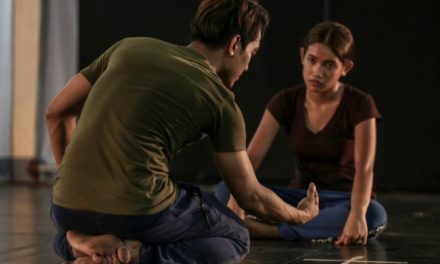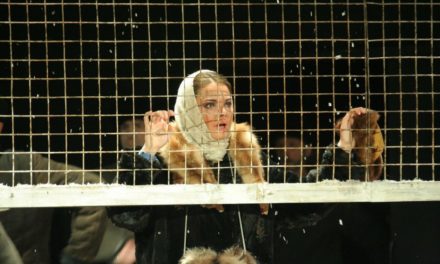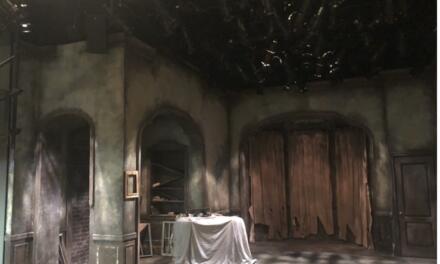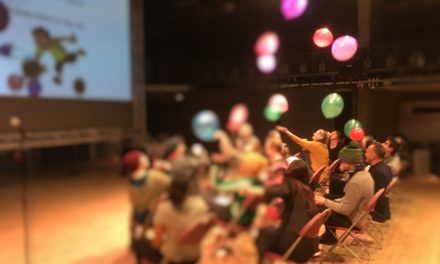The annual ATHE (Associations for Theatre in Higher Education) conference took place in Orlando, FL, from August 7 to 11, 2019, with the theme, “Scene Changes: Performing, Teaching, and Working through the Transitions.” The theme reflects the conference’s return to Orlando since 2013, what has transpired in Orlando in recent history, and the resulting nation-wide shifts in culture, politics, the arts, and the academia. Harvey Young, the president of ATHE, captures the significance of Orlando as a site marked by the coexistence of drastic opposites:
Orlando is a city of contradictions. Thanks to aggressive marketing, it stands predominantly as a place where fantasies come to life […] Arguably the happiest place on earth, this region has served as the backdrop to heart-breaking tragedy. It is here that the US government waged war against and forcibly relocated the Seminole Nation. Not far away, Trayvon Martin was killed because a neighbor did not believe that a black teenager could or should live nearby. A few miles down Interstate 4, an act of terror at a LGBTQ nightclub serving a majority Latinx clientele claimed forty-nine lives. Unspeakable sorrow and suffering are a part of the history and present of Orlando. (President’s Welcome, ATHE Program, 5)
The theme and site of the conference offered ample room to explore how theatre and performance reflect and address our history in the present, and what responsibilities lie in performing and teaching in our efforts to shape the future.
The Dramaturgy Focus Group (DRFG) was dramaturgically engaged with the theme and the conference as a whole. The DRFG organized a conference-wide scavenger hunt, asking conference members to take a photo and tweet about activities including “Help a colleague clean up after their presentation,” “Swim in the pool,” “Visit your favorite publishing booth,” “Go to a morning warmup,” and “Pick up some litter,” thus expanding the conference landscape site to social media. Committee Members gave insightful presentations, asked pertinent questions, and joined in-depth discussions in the DRFG-sponsored panels including “Discovery in Practice and Pedagogy,” “Decolonizing Institutional Norms: Syllabi and. . . ,” “Dramaturgy Focus Group Debut Panel,” “Excellence in Translation: The Inaugural Orinda Award,” “New Play Development Workshop,” “Dramaturgy as Public Criticism,” and “Collaborative Models of Applied Theatre.” The broad function of dramaturgy was also notable in presentations beyond the DRFG-sponsored panels such as “When Gods Transcend Gender: The Dramaturgy of Michael Arden’s Unconventional Casting Practices in Once On This Island” (Music Theatre / Dance), “Performing Arts Librarian as Curator: How Dramaturgy Shapes Information Design” (Theatre History), and “(W)holistic Dramaturgy: Combining Traditional, Physical, and Emotional Dramaturgy in Movement Based Storytelling” (Professional Development Committee). The applied presence of dramaturgy through the whole conference affirmed the integral function of dramaturgy across disciplines as well as the significant contribution of the DRFG to the understanding, practice, education, and outreach of the practice at ATHE and beyond.
After the 2019 Conference, I asked several core members of the DRFG, past and present, to share their thoughts about what the committee means to them, how the group helped them to develop their practice as dramaturgs, and their ideas about where the field of dramaturgy is headed. The following is a list of members and a brief history of their participation.
Participating Members (Name: Current Affiliation; Years in the DRFG; Past Posts; Current Post)
Geoff Proehl: Professor Emeritus at University of Puget Sound; DRFG Member from inception to 2008, regular participant in Focus Group, with exception of 1994, 2002, 2005, 2006; Past Posts: Founding Member, Conference Planner, 1996-1998, Focus Group Rep (chair), 1998-2000.
Shelley Orr: Faculty at San Diego State University; 25 years in the DRFG; Past posts: Member-at-Large, Conference Planner, Focus Group Representative, Nominations Chair; Current Post: Debut Panel Chair
Bryan Moore: Faculty at Concordia University, Nebraska; 14 years in DRFG; Former Posts: Member-at-Large, Conference Planner, and Focus Group Representative; Current Post: Nominations Chair
Martine Kei Green-Rogers: Faculty at SUNY New Paltz; 7 years in DRFG; Past Posts: Conference Planner; Current Post: Focus Group Representative
Sarah Johnson: Faculty at Texas Tech University; 5 years in DRFG; Past Posts: Debut Panelist, Member-at-Large and Graduate Representative; Current Post: Electronic Communications Co-Chair
Dan Smith: Faculty at Michigan State University; DRFG Member since 2002; Current Post: Conference Planner
LaRonika Thomas: Ph.D. Candidate, University of Maryland; 10 years in DRFG; Former Posts: Graduate Student Representative; Current Post: Electronic Communications Co-Chair
Jacob Hellman: Ph.D. Candidate, University of Wisconsin-Madison; 10 years in DRFG; Former Post: Graduate Student Representative; Current Post: Member-at-Large
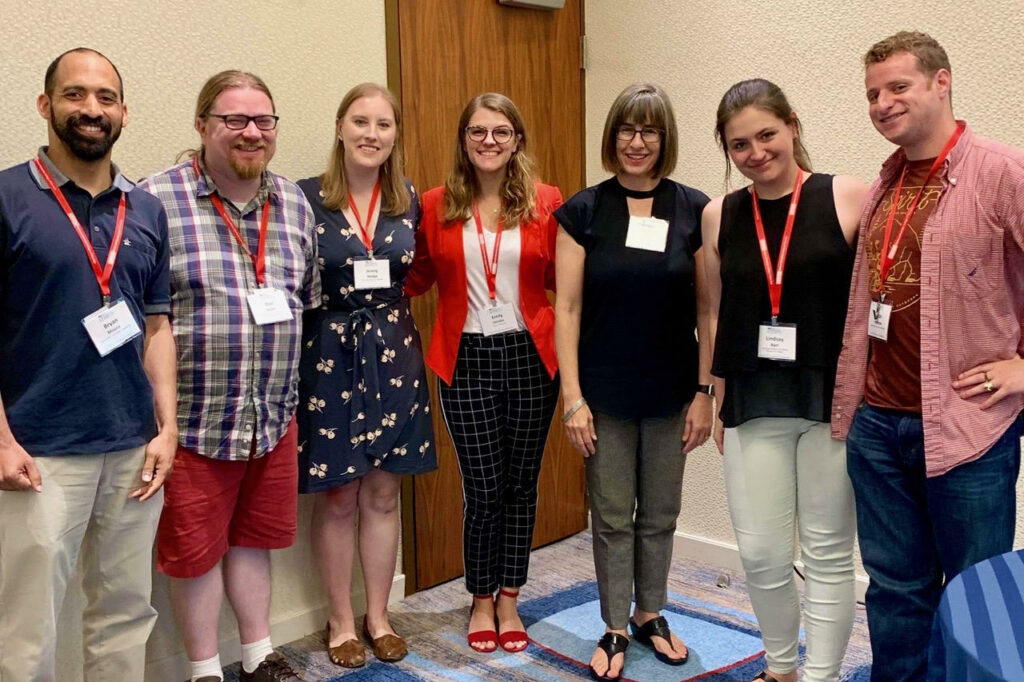
After the Dramaturgy Debut Panel on 8 August 2019 in Orlando, Florida. The three presenters for 2019 joined by past debut panel presenters from various years. From the left: Bryan Moore, Dan Smith, Jenny Sledge, Emily Dzioba, Shelley Orr, Lindsay Barr, and Jacob Hellman. Photo: Karen Jean Martinson
Walter Byongsok Chon (WBC): What was the highlight for you this year? What made this year meaningful for you?
Shelley Orr (SO): There were two highlights of the 2019 conference for me: the presenters on the Dramaturgy Debut Panel this year carried on the tradition admirably, and all three presentations were clear, well contextualized, and thought-provoking. I realize that I am biased (as the chair of the panel), but the presentations this year were excellent and pushed the field of Dramaturgy to consider new frontiers, such as dramaturging devised works, serving as the production dramaturg on the first production of a new play when one did not serve as the development dramaturg, and the unique requirements of dramaturging for a comedy. The other highlight of the conference was the keynote speech by Bill Rauch (Artistic Director, Perelman Center at the World Trade Center). His speech artfully took up extremely important issues of the community in the theatre, asking with urgency, in effect, “for whom do we perform?” and “what does this community need from this performance?”
Bryan Moore (BM): This was a good and important year for networking for me, especially with those beyond the focus group. Beyond my personal interests in meeting new people in the theatre world, it is important to reach out to other artists and focus groups to find potential collaborations to enhance our theatrical field. Additionally, with my new responsibilities [as President-Elect of] LMDA (Literary Managers and Dramaturgs of the Americas), I wanted to make sure I reached out to others to find out how the DRFG, LMDA, and how dramaturgy in general, can contribute to the efforts within and beyond ATHE.
Dan Smith (DS): This year’s highlight for me was the Scavenger Hunt, which helped build community within DRFG and across the conference by encouraging social media content.
LaRonika Thomas (LT): Every year, there are multiple highlights for me at ATHE’s conference. One that stands out this year is the discussion portion of a Sunday morning roundtable I was on, organized by Gina Di Salvo and Dan Smith, called Dramaturgy as Public Criticism. We had a lively discussion about everyone’s work, including some great responses to a question I asked about public-facing dramaturgy and the way that capitalism “values” works of art. And after that discussion, Gina Di Salvo gave me some advice about dissertation writing that was mind-blowing in that it gave me language for something I’ve been struggling with for a while. I think that is one of the most valuable things about ATHE – those post panel and hallway conversations that spill out from the conference rooms can be as important or more so than the paper you delivered.
Jacob Hellman (JH): This year’s highlight for me was, ironically, the Dramaturgy Focus Group. Even though there were fewer of us present due to unforeseen circumstances, everyone’s voice was heard in both meetings and everyone played an active role in determining the future of our little working group. I was also tasked with planning our annual DNO, and with a Teppanyaki dinner and performance at Kobe Japanese Steakhouse, it was truly a night none of us will ever forget.
WBC: In the past years of as a member of the Dramaturgy Focus Group, what was the most meaningful memory about the DRFG – something you did, an event or panel organized by DRFG, other experience, etc.? What made it so memorable?
Geoff Proehl (GP): This is and has been an amazing community of people and whether it was generating ideas for the next conference, supporting one another’s panels, or getting a drink at the end of the day, I never doubted or questioned the goodwill of everyone involved. The conversations that took place at ATHE and LMDA have informed everything I think and have thought about the field. It was a place to develop projects and was deeply supportive at each step of the way. The synergy with LMDA has been tremendous. Our community was stronger because we could meet and work together two times a year: in June at LMDA and in late July or August at ATHE.
SO: At one of the first ATHE conferences that I attended, I recall speaking with Geoff Proehl and D.D. Kugler about dramaturgy (over a drink!). Even at that time in the 1990s, Proehl and Kugler were at the top of the leadership of the field of Dramaturgy, and I was a graduate student. The generosity with which they gave of their time was something that I carried with me. I do my best to hold up their banner in this respect at every conference that I attend. As the Chair of the Dramaturgy Focus Group Debut Panel, it is actually my job to encourage graduate students, and what a wonderful job it is! (Be very jealous.)
BM: I always look forward to the annual Dramaturgy Debut Panel session, as that is how I got involved with ATHE and the focus group. It is exciting to see how others are using dramaturgical techniques in their work, and to meet the newer faces of dramaturgy. The session often brings together dramaturgs who are early in their careers as well as the veterans of the field, with the latter excited to support the former. Ultimately, we work together to keep dramaturgy alive and strong.
I have also been pleased with the evolution of dramaturgical site visits at ATHE. I helped lead the first DRFG Pre-Conference, which was a site visit to Frank Lloyd Wright’s Taliesin West in Arizona in 2014. Since then, the DRFG has sponsored site visits and corresponding sessions in other conference cities, including Montreal, Chicago, and Las Vegas, to explore the connections of architecture, food, and other factors to the history and culture of our conference locales. Expanding our dramaturgical reach can help offer new perspectives to our world and how theatre can influence everything around us, and vice versa.
Martine Kei Green-Rogers (MKG): I loved the pre-conference we did in Montreal in 2015. That is still my favorite. A dramaturgical food tour of old Montreal. What is there not to like about that?
Sarah Johnson (SJ): Organizing the 2018 Boston Pre-conference with Olga Sanchez Saltveit was a highlight of my time with the focus group. We split up and took multiple history walking tours of the city and then reconvened with a local Boston historian to dramaturg the telling of history done on these tours. We compared the narratives told by different identity affinity groups, the methodology of the different tour guides as performers, and examined the way different experiences of Boston’s history was privileged. The conversation was stimulating, and I find myself referencing the ideas we discussed regularly.
DS: I have enjoyed our city-specific dramaturgical analysis of tourist sites. My favorite experience with these was co-organizing the Las Vegas session on Casino Dramaturgy with Karen Jean Martinson in 2017. We had six presentations on Las Vegas sites, and it was a great way to explore the city using dramaturgy as a critical lens. Another favorite experience was having DRFG sponsor a staged reading of my translation of Madame de Beaunoir’s play “A Dangerous Liaison” at the Montreal conference in 2015. I felt such support from my colleagues for my work as a translator, which is part of what drew me to dramaturgy in the first place.
LT: I really loved organizing and leading the DRFG pre-conference in Chicago in 2016 – the Chicago Architectural Foundations River Cruise tour of downtown Chicago. Not only did it hit upon my dissertation work on civic dramaturgy – and Chicago – but also it was a great way to kick off that conference and introduce folks to Chicago and get them thinking about the city as a space of performance.
JH: 10 years of memories with DRFG? That’s like asking me to pick a favorite child. But one standout memory is our Dramaturgy Pre-Con at Taliesin West in Scottsdale, Arizona in 2014. We took a fun tour of Frank Lloyd Wright’s love letter to the American West, and had a scintillating conversation over mojitos afterward. The social aspect of ATHE makes it my most favorite time of year. Another meaningful memory comes from the first time I planned and convened a panel, at the conference in Washington, DC, in 2012. It was unusual but exciting to be the recipient of proposals, a few of which I even had to turn down, as well as receiving the phone call from Karen Jean Martinson that my proposal had been accepted.
WBC: How has the Dramaturgy Focus Group helped you with your understanding of dramaturgy, with your growth as a dramaturg, and your practice of, and/or career as, a dramaturg?
SO: The Dramaturgy Focus Group has helped to expand my definition of the practice of Dramaturgy. Over the years, expanding the definition of the job has happened at almost every ATHE annual conference. Panels that I have seen or presented on have considered the practice of dramaturging classic plays, new plays, Spanish Golden Age plays, musicals, dance, opera, site-specific performances, adaptations, devised pieces, social justice plays, and even improvised performance. The dramaturgs who have presented have also expanded the range of methods I use to practice dramaturgy. ATHE has also been a place where I could carefully consider what it means to be a dramaturg in an academic setting. The mentorship that I received through ATHE has been instrumental to my development and has served as a positive model for how I now mentor students and early career dramaturgs both at my home institution, San Diego State University, and in my capacity as Chair of the Dramaturgy Debut Panel.
BM: I first met the majority of my dramaturgy mentors and peers through the Dramaturgy Focus Group, so it is like a foundation for my career. Seeing these theatre artists involved in other focus groups and in projects beyond their classrooms supported my interests in diversifying my theatrical and academic skill sets, which allow me to see the theatre and world through multiple lenses. I believe that is a core component of dramaturgy: the ability to morph your skills to what is required of the current task or project, within or outside of the theatre. Beyond production work, I need and use dramaturgy in my teaching, parenting, and everyday life.
MKG: In my earlier years attending the conference, it was just great to be in a room full of dramaturgs and talk about the trends in dramaturgy and in higher ed. Now, I am interested in what we are teaching and how that intersects (or not) with the artistry as practiced in the field. I also love going to the Debut Panel to see what new ways of dramaturgy is being practiced by our newer-to-the-field colleagues.
SJ: The focus group connects me to dramaturgs around the world and exposes me to their diverse range of practices. Being in a network of dramaturgs in higher education gives me specific resources for education, mentorship, and logistics in our unique dramaturgical situation.
DS: The Dramaturgy Focus Group has helped me reflect on past projects and dream up new ones. Over the years I have participated in sessions on Visual Dramaturgy, Dramaturgy as Public Criticism, and Dramaturgies of Translation and Adaptation. I have received excellent mentorship and made fantastic connections with many active and curious dramaturgs.
LT: I have found valuable mentorship in the DRFG. It is both a close-knit and welcoming group. I always tell folks who are encountering us for the first time that we are the best ATHE focus group, objectively speaking. That’s a joke, of course, but I also think there is a joy to our focus group that is not found in every conference room. Folks in the DRFG are kind, willing to show up and do the work, and always open to conversation about the field, ideas, current issues, dilemmas, and so on. Every year I come away with a better understanding of who I am as a dramaturg and the possibilities within my own work and within the field, and that is really thanks to the other lovely scholars “in the room where it happens.”
JH: Anyone who doubts the power of dramaturgy should spend just one afternoon with the DRFG as a whole, or with one of its members. Through the DRFG I have seen how drama, theatre, and performance really transcends the stage and can be malleable to so many different interests and experiences, from the American government to environmental policy to digital media to just about any language or culture of which you could think.
WBC: Where do you see dramaturgy going? What new trends do you see in dramaturgy?
GP: I’m not sure. That’s what I’m trying to figure out this year.
SO: The new trend that I have seen gaining force in theatre is Immersive, so I see dramaturgy expanding yet again to meet this innovative form that foregrounds meaningful engagement with audience members. The Dramaturg is well-positioned to be a key collaborator in developing immersive theatre pieces because we are always thinking about a performance’s relationship to the audience.
BM: I would like to say that the act and presence of dramaturgy are advancing but could be better. The potential of dramaturgy grows as we improve our communication and collaboration skills, and expand our use of different technologies. More people acknowledge that dramaturgy exists in many forms and is useful, and even required, in all that we do in theatre, from the beginning of the writing/creation process to the conversations after the show is performed.
That said, some companies still do not invest in dramaturgy as much as they should, if at all. I have heard stories in the past of dramaturgy seen as some kind of opposing, unproductive force; I would hope (maybe naively) that is not so much the case now. Maybe they see dramaturgy as an option instead of a necessity, or as something that the other artists can do on their own. Expanding an artist’s already full workload, though, risks spreading their time thinner and hurting the quality of their work.
Whatever the reason, the current challenge is supporting our dramaturgs, who develop and hone their craft to contribute to the collaboration process and its product. That support includes access to resources, job and career opportunities for early-career and established dramaturgs and appropriate compensation for their work. Again, dramaturgy is trending up, but it can go much higher.
MKG: I am seeing its growth in new play realms but also I am seeing how it is the first position on the chopping block as theaters restructure the way literary management and dramaturgy are practiced. I am both hopeful and scared, but I think as we continue to focus on it in higher education, the practitioners we are educating now will help keep the field alive!
SJ: I’m really interested in dramaturgy for applied theatre. I’ve recently found myself as the dramaturg for projects in applied theatre, and I’ve found the classic conundrum of our profession present there: dramaturgy is happening but it’s not always being done by someone identified as a dramaturg. I hope to explore what the best practices are for dramaturgy in an applied theatre setting and advocate for the inclusion of a dramaturg as a distinct role in the process.
DS: I think we are seeing the fulfillment of a movement toward dramaturgs taking the reigns as producers and administrators, and this is leading to more reflection on building community. Who is included? Who is invited? Who has access? What do our communities want? What do our communities need? Not that we aren’t always thinking about these kinds of questions, but it feels like we are thinking a bit more urgently about the community in relation to citizenship.
LT: I’m sure this is partially my own bias, but I see dramaturgy growing beyond the stage. This is not to say that protocols and post-show discussions and new play development are not important, but I see dramaturgical concepts increasingly used to talk about everyday processes and phenomena. At least, I hope so, since my scholarly work depends on it! I see dramaturgy growing beyond a list of tasks and skills – the dramaturg as helpmate – and really being used to discuss concepts and viewpoints – Geoff Proehl’s “dramaturgical sensibility,’ if you will.
JH: Through my experiences with the DRFG, I see dramaturgy as something that is living, breathing, and exciting. I want to see more undergraduates involved in dramaturgy; something I was not as able to experience as much of in my own undergraduate experience but is now being brought into the classroom by ATHE colleagues from New York to California. I see dramaturgy being applied in an interdisciplinary manner, to connect with other aspects of theatre such as playwriting, acting, and design, as well as reaching out to other areas. The dramaturgy “debs”[Debut Panel panelists] program continues to impress, and I hope that more people who go through that program stay with ATHE and keep up with new and exciting work; among this year’s debutantes was Lindsay Barr, whose work with a production around the Manhattan Project was particularly captivating.
WC: Thank you all for sharing your thoughts! I look forward to seeing you all in Detroit in 2020.
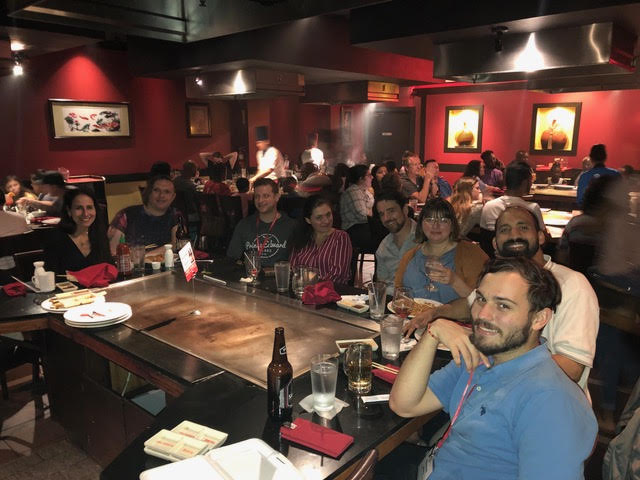
Dramaturg’s Night Out, Kobe Japanese Steakhouse, Lake Buena Vista, Orlando, FL. August 10, 2019. Photo: LaRonika Thomas
This post was written by the author in their personal capacity.The opinions expressed in this article are the author’s own and do not reflect the view of The Theatre Times, their staff or collaborators.
This post was written by Walter Byongsok Chon.
The views expressed here belong to the author and do not necessarily reflect our views and opinions.

